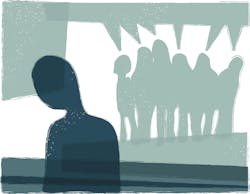When Craig Metcalfe began driving three years ago, his trainer and co-workers warned him about the loneliness of the job.
Metcalfe (who asked that his real name not be used) said: "It was fine with me. I enjoy being on my own. That's one of the things that attracted me to driving." After a few months, however, the 25-year old driver started feeling lonely and disconnected from his family and friends. He talked on the phone, listened to podcasts, exercised and did all the things that experts say to do to stave off isolation and loneliness, but they weren't enough.
He said he felt depressed and there were times when he could barely get out of his bunk. After hustling to pay back some of his training costs, he quit and got a job driving a local delivery van. "I am so much happier," he said. "I talk to people all day, even if it's just 'hello, here's your delivery,' and I feel so much better about my life."
Metcalfe is not alone – so to speak. Isolation and loneliness are one of the main complaints from drivers, especially long-haul operators, who, like Metcalfe, thought they would relish being by themselves for long periods of time.
Feelings of loneliness may be reaching epidemic levels and not just among truck drivers although they are on the forefront because of the nature of their job. "According to a recent survey by Cigna, nearly half of Americans report often feeling alone and 'left out,' and 43% feel isolated from other people," said Jeremy Nobel, M.D., founder of The Foundation for Art & Healing and The UnLonely Project. "I mention these statistics because I want to illustrate that loneliness and social isolation are at epidemic levels in the United States. They aren’t problems specific to a small population of people and not just truck drivers."
Nobel is board certified in both internal medicine and preventive medicine, and currently serves on the faculty of the Harvard Medical School in the Department of Global Health and Social Medicine.
He and others who study loneliness point out that being alone doesn't always mean being lonely. "Social isolation and loneliness are two different experiences. Social isolation is something that can be quantified. It’s a lack of relationships and interactions with other people. Loneliness is a much more individualized phenomenon. It signifies a gap between the personal connections someone experiences, and the interactions they crave. Someone can be around others all the time and still experience both the feelings and the physical side effects of loneliness. A person who spends a significant amount of time alone may be perfectly content doing so."
Not only does loneliness affect our mental well-being but our physical health as well. Nobel notes: "Studies have shown that chronic loneliness can have the same effect as smoking 15 cigarettes a day; both increase the risk of early morality by about 30 percent. Loneliness can also lead to impaired immune system function, arthritis, cancer, type 2 diabetes and heart disease."
Loneliness can actually change the brain's physiology, according to studies. "I am familiar with neuroplasticity (The brain's ability to reorganize itself by forming new neural connections throughout life.) which is what happens (in this case) when we don't get stimulated through socialization, conversation, and human contact that the brain actually begins to change," said Edy Nathan, MA, LCSW, psychotherapist and author of It's Grief: The Dance of Self-Discovery through Trauma and Loss.
"We can see it in babies and children who do not get touched or socialized: they fail to thrive. It is the same thing in adults. When we don't have social outlets, when we don't talk, when we don't exercise - exercise can actually help with that sense of loneliness - we fail to thrive and the brain gets affected. It's almost like parts of the brain begin to shut down and socialization then becomes that much harder."
She agrees with Nobel that loneliness is endemic, and partly blames how we communicate on social media. "We don't get the cues from people's voices. We don't feel energy. We're texting, doing Instagram, tweeting or Snapchatting and it's momentary; you're in and you're out, and we're not going into the depth that we used to get into. We're not getting a sense of energy or charisma, and I think it's actually creating a sense of loneliness cross-culturally and for all ages." (The UK has recently established a Minister of Loneliness, citing the growing physical and mental health risks of loneliness. Prime Minister Teresa May called loneliness "one of the greatest public health challenges of our time.")
Nathan notes that for truck drivers it's important to listen to cues that you are reaching a threshold of feeling lonely. "I'm sure that some drivers ignore it because they've got things they have to be doing and places they need to be… they've got time restraints, and maybe they're driving at night, so perhaps there's also sleep disorientation. They ignore the cues, and when they ignore the cues, there's danger. That loneliness then moves into depression, grief or losing a sense of the self."
She adds: "When the thought comes into your brain, 'Oh, let me call my wife or let me reach out,' stop and do it. Don't ignore it. Don't try to push through it. Don't try to pretend like it doesn't exist."
Nathan says that exercise can stimulate the brain and help mitigate loneliness, and so does staying hydrated. Dehydration is also a depressant and can also affect brain chemistry.
Nobel concludes: "The UnLonely Project’s mission is to raise awareness about loneliness and social isolation and explore creative pathways towards connection. Personal connections, ultimately, are the antidote to loneliness."





